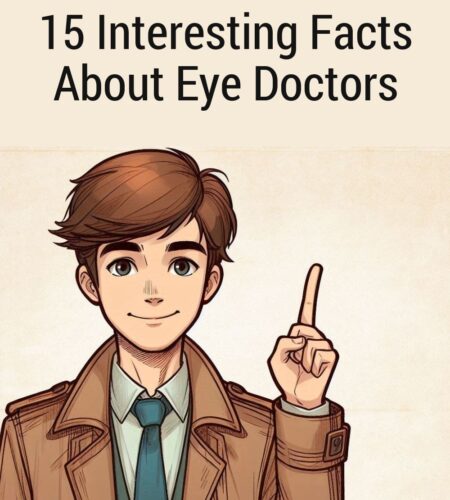Introduction:
Eye doctors, also known as optometrists or ophthalmologists, play a crucial role in maintaining our vision and overall eye health. They are skilled professionals who dedicate their lives to providing extensive eye care services. In this article, we will explore 15 fascinating facts about eye doctors that you may not be aware of. So, let’s dive in!
Fact 1: Eye Doctors Must Undergo Extensive Education and Training
Becoming an eye doctor requires years of rigorous education and training. After completing their undergraduate studies, aspiring eye doctors must attend optometry school, earn a Doctor of Optometry (O.D.) degree, and then pass licensing exams. This comprehensive educational journey prepares them to handle various eye conditions and provide the best possible care to their patients.
Fact 2: Eye Doctors Are Specialized in Different Fields
Eye doctors can specialize in various areas to cater to specific eye care needs. Some become pediatric optometrists, focusing on children’s eye health, while others become cornea specialists or retina specialists. This specialization allows them to offer specialized care and treatment for specific eye conditions and diseases.
Fact 3: They Use Advanced Technologies to Diagnose Eye Conditions
Over the years, eye doctors have adopted cutting-edge technologies to enhance their diagnostic capabilities. From digital retinal imaging to optical coherence tomography, these technological advancements enable eye doctors to assess the health of the eyes more accurately and detect various eye diseases at an early stage.
Fact 4: Eye Doctors Can Prescribe Corrective Eyewear
If you have poor vision, chances are you have visited an eye doctor for a prescription of corrective eyewear, such as glasses or contact lenses. Eye doctors not only determine your visual prescription but also help you choose the most suitable eyewear based on your lifestyle and preferences.
Fact 5: They Treat Eye Infections and Injuries
Eye doctors are equipped to handle various eye infections and injuries. Whether it’s conjunctivitis, a scratched cornea, or something more severe, they possess the expertise to provide appropriate treatment and alleviate discomfort.
Fact 6: Eye Doctors Play a Crucial Role in Detecting and Managing Eye Diseases
Regular eye exams conducted by eye doctors can detect and monitor eye diseases like glaucoma, cataracts, and diabetic retinopathy. Early detection is vital for effective management and prevention of further deterioration, highlighting the importance of routine eye check-ups.
Fact 7: They Can Perform Eye Surgeries
In addition to providing primary eye care, some eye doctors specialize in performing eye surgeries. These procedures may include LASIK, cataract surgery, corneal transplants, and more. Eye surgeons undergo advanced training to ensure safe and successful surgical interventions.
Fact 8: Eye Doctors Advise on Lifestyle Changes for Better Eye Health
Eye doctors not only treat eye conditions but also emphasize the significance of adopting a healthy lifestyle for better eye health. They may recommend maintaining a balanced diet, quitting smoking, wearing sunglasses in sunlight, and taking regular breaks from digital screens to protect the eyes’ long-term well-being.
Fact 9: They Are Well-Versed in Low Vision Rehabilitation
Eye doctors are trained to assist individuals with low vision, a condition where central or peripheral vision becomes severely impaired. They counsel patients about visual aids, techniques, and rehabilitation programs that can improve their quality of life and independence.
Fact 10: Eye Doctors Educate Patients About Eye Care
As experts in their field, eye doctors play a vital role in educating patients about proper eye care. From teaching proper contact lens hygiene to explaining the importance of protective eyewear, they empower individuals to take care of their eyes and prevent potential eye problems.
Fact 11: They Stay Updated with Advancements in Eye Care
Eye doctors dedicate time to staying updated with the latest advancements in eye care. They attend conferences, read scientific journals, and engage in continuous education to ensure they can offer the most effective and innovative treatments to their patients.
Fact 12: Eye Doctors Can Detect Systemic Health Issues
During routine eye exams, eye doctors often detect symptoms of systemic health issues like diabetes, hypertension, and even certain types of cancers. These findings can prompt patients to seek further medical attention, leading to early diagnosis and appropriate management.
Fact 13: They Can Provide Vision Therapy
Eye doctors may recommend vision therapy for patients with conditions like lazy eye, strabismus, or focusing problems. Vision therapy consists of a series of exercises and activities that strengthen the visual system, helping patients improve their vision and overcome visual deficiencies.
Fact 14: They Prioritize Patient Comfort and Satisfaction
Eye doctors strive to create a comfortable and friendly environment for their patients. A welcoming atmosphere, clear communication, and personalized care are among the top priorities for eye doctors, ensuring that patients feel at ease during their visits.
Fact 15: Eye Doctors Advocate for Eye Health on a Global Scale
Many eye doctors actively contribute to global eye health initiatives. They participate in programs that provide vision care to underserved communities, volunteer in eye clinics worldwide, and advocate for improved accessibility to eye care services. Their efforts help address vision disparities and raise awareness about the importance of eye health.
Conclusion
Eye doctors serve a crucial role in maintaining our vision and overall eye health. Their extensive education, specialized knowledge, and commitment to utilizing advanced technologies ensure optimal eye care for patients. From diagnosing eye conditions to performing surgeries, they play a multifaceted role in preserving our precious sense of sight. So, the next time you visit your eye doctor, appreciate their expertise and dedication to keeping your eyes healthy and vibrant.
Subscribe to our email newsletter to get the latest posts delivered right to your email.




Comments